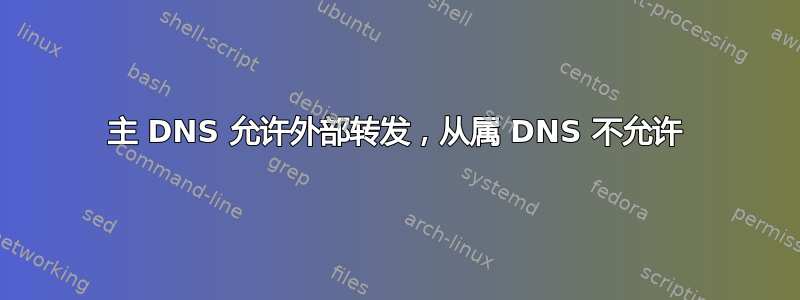
我们有一个 2 主设置,但构建得很糟糕,所以我们想将第二个主配置降级为从配置,我尝试运行转换,它运行良好的内部地址,但当它尝试访问外部世界时,它说网络不可达,无法提供 DNS 响应。有什么帮助吗?
我已附加了 named.conf
//
// See the BIND Administrator's Reference Manual (ARM) for details, in:
// file:///usr/share/doc/bind-*/arm/Bv9ARM.html
// Also see the BIND Configuration GUI : /usr/bin/system-config-bind and
// its manual.
//
options
{
// Those options should be used carefully because they disable port
// randomization
// query-source port 53;
// query-source-v6 port 53;
// Put files that named is allowed to write in the data/ directory:
directory "/var/named"; // the default
dump-file "data/cache_dump.db";
statistics-file "data/named_stats.txt";
memstatistics-file "data/named_mem_stats.txt";
forwarders {
8.8.8.8;
8.8.4.4;
};
};
logging
{
/* If you want to enable debugging, eg. using the 'rndc trace' command,
* named will try to write the 'named.run' file in the $directory (/var/named).
* By default, SELinux policy does not allow named to modify the /var/named directory,
* so put the default debug log file in data/ :
*/
channel default_debug {
file "data/named.run";
severity dynamic;
};
};
//
// All BIND 9 zones are in a "view", which allow different zones to be served
// to different types of client addresses, and for options to be set for groups
// of zones.
//
// By default, if named.conf contains no "view" clauses, all zones are in the
// "default" view, which matches all clients.
//
// If named.conf contains any "view" clause, then all zones MUST be in a view;
// so it is recommended to start off using views to avoid having to restructure
// your configuration files in the future.
//
view "localhost_resolver" {
/* This view sets up named to be a localhost resolver ( caching only nameserver ).
* If all you want is a caching-only nameserver, then you need only define this view:
*/
match-clients { localhost; };
match-destinations { localhost; };
recursion no;
# all views must contain the root hints zone:
include "/etc/named.root.hints";
/* these are zones that contain definitions for all the localhost
* names and addresses, as recommended in RFC1912 - these names should
* ONLY be served to localhost clients:
*/
include "/etc/named.rfc1912.zones";
zone "company.corp" {
type slave;
file "slaves/company.corp.zone";
allow-transfer { 10.69.0.10; };
masters { 10.69.0.10; };
forwarders {};
};
zone "company.dev" {
type slave;
file "slaves/company.dev.zone";
allow-transfer { 10.69.0.10; };
masters { 10.69.0.10; };
forwarders {};
};
zone "69.10.in-addr.arpa" {
type slave;
file "slaves/company.corp.rr.zone";
allow-transfer { 10.69.0.10; };
masters { 10.69.0.10; };
forwarders {};
};
zone "70.10.in-addr.arpa" {
type slave;
file "slaves/company.corp.rr.70.zone";
allow-transfer { 10.69.0.10; };
masters { 10.69.0.10; };
forwarders {};
};
};
view "internal" {
/* This view will contain zones you want to serve only to "internal" clients
* that connect via your directly attached LAN interfaces - "localnets" .
*/
match-clients { any; };
match-destinations { any; };
recursion no;
// all views must contain the root hints zone:
include "/etc/named.root.hints";
// include "named.rfc1912.zones";
// you should not serve your rfc1912 names to non-localhost clients.
// These are your "authoritative" internal zones, and would probably
// also be included in the "localhost_resolver" view above :
zone "company.corp" {
type slave;
file "slaves/company.corp.zone";
allow-transfer { 10.69.0.10; };
masters { 10.69.0.10; };
forwarders {};
};
zone "company.dev" {
type slave;
file "slaves/company.dev.zone";
allow-transfer { 10.69.0.10; };
masters { 10.69.0.10; };
forwarders {};
};
zone "69.10.in-addr.arpa" {
type slave;
file "slaves/company.corp.rr.zone";
allow-transfer { 10.69.0.10; };
masters { 10.69.0.10; };
forwarders {};
};
zone "70.10.in-addr.arpa" {
type slave;
file "slaves/company.corp.rr.70.zone";
allow-transfer { 10.69.0.10; };
masters { 10.69.0.10; };
forwarders {};
};
//zone "my.internal.zone" {
// type master;
// file "my.internal.zone.db";
//};
//zone "my.slave.internal.zone" {
// type slave;
// file "slaves/my.slave.internal.zone.db";
// masters { /* put master nameserver IPs here */ 127.0.0.1; };
// // put slave zones in the slaves/ directory so named can update them
//};
//zone "my.ddns.internal.zone" {
// type master;
// allow-update { key ddns_key; };
// file "slaves/my.ddns.internal.zone.db";
// // put dynamically updateable zones in the slaves/ directory so named can update them
//};
};
key ddns_key {
algorithm hmac-md5;
secret "";
};
//view "external"
//{
///* This view will contain zones you want to serve only to "external" clients
// * that have addresses that are not on your directly attached LAN interface subnets:
// */
// match-clients { any; };
// match-destinations { any; };
//
// recursion no;
// // you'd probably want to deny recursion to external clients, so you don't
// // end up providing free DNS service to all takers
//
// allow-query-cache { none; };
// // Disable lookups for any cached data and root hints
//
// // all views must contain the root hints zone:
// include "/etc/named.root.hints";
//
// // These are your "authoritative" external zones, and would probably
// // contain entries for just your web and mail servers:
//
// zone "my.external.zone" {
// type master;
// file "my.external.zone.db";
// };
//};


